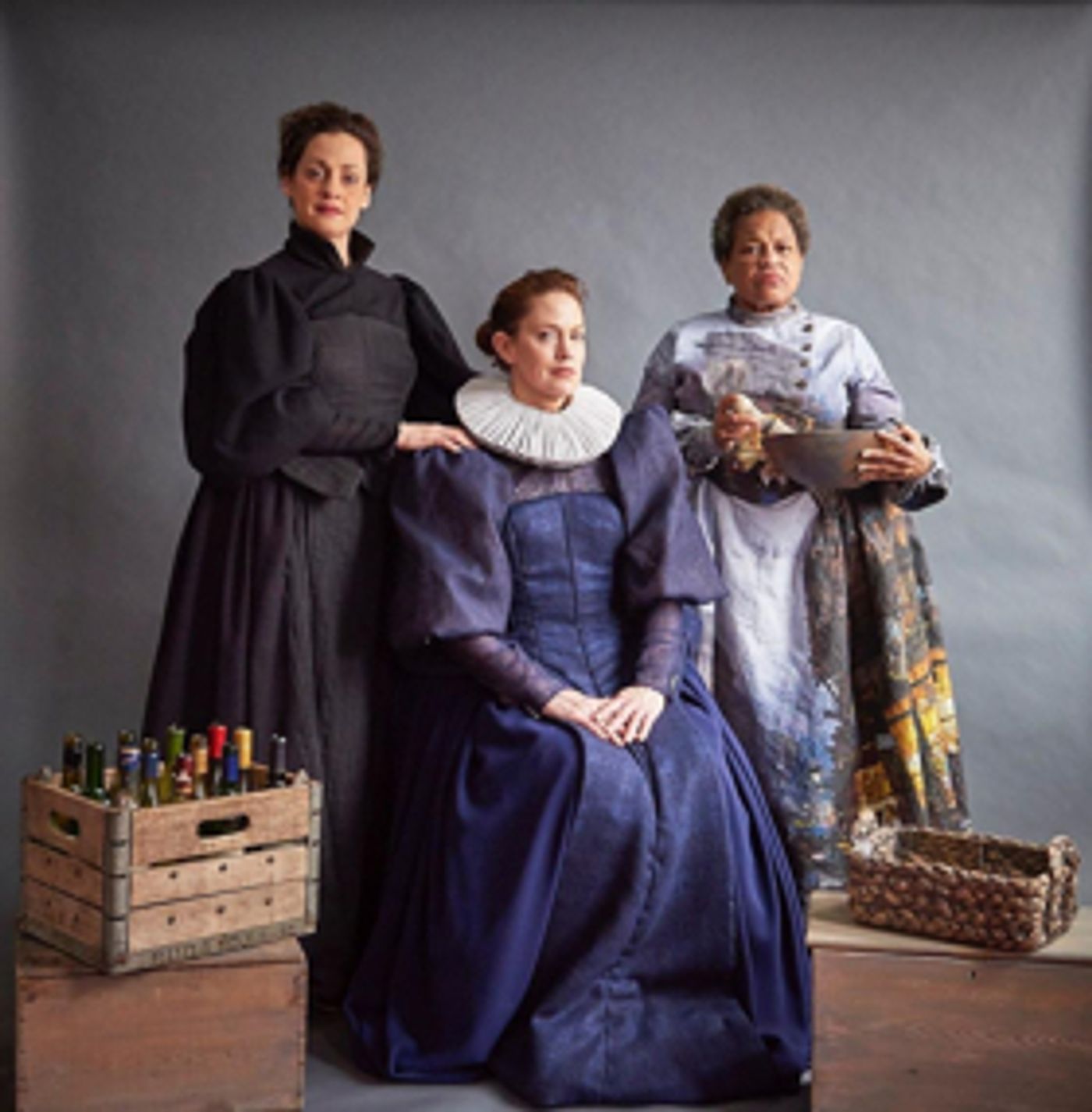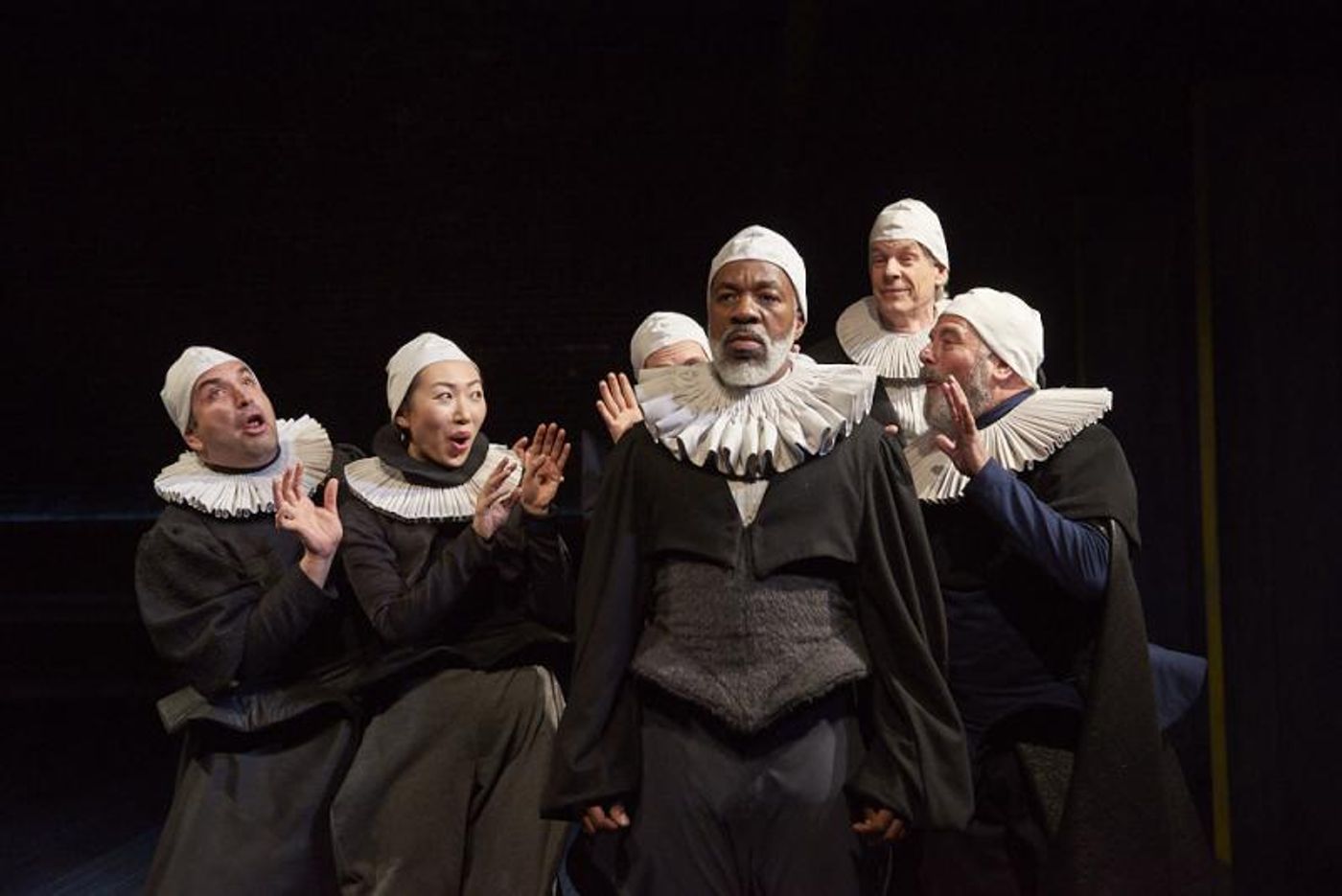Review: Portland Stage's BABETTE'S FEAST Has Contemporary Resonance

Portland Stage has mounted an adaptation of Isak Dinesen's short story Babette's Feast, conceived by Abigail Killeen and written by Rose Courtney, that retains the message of grace and humanity at the core of the tale, while casting the narrative in an entirely different, highly contemporaneous light. Intriguing and sometimes perplexing in its Brechtian staging, this production adheres closely to the Dinesen text and bears little resemblance to the iconic movie of 1987.
Set in the remote Norwegian town of Berlevåg, Dinesen's tale tells the story of two once beautiful spinster sisters in who eschew wordly happiness for a devout, ascetic life that follows the teachings of their Pietist minister father. Having given up worldly happiness and love in their youth, the sisters come to learn the meaning of true grace through the culinary artistry of a French political refugee whom they have sheltered and who has been their servant for twelve years. The famous eating scene - so different and yet so poignant in this production - contains Dinesen's soaring message about the oneness of humanity and the spiritual heights that opening our hearts and sharing our commonalities as human beings can bring r- emains powerful and moving.
Courtney's play adheres very closely to the Dinesen text, at the same time that it calls for a number of revolutionary changes to the traditional tale. Instead of the Scandinavian and French protagonists, this version uses multi-ethnic ensemble who not only play a variety of roles but also disregard their gender specificity. The refugee Babette is quite consciously cast with an African-American actress, and the emphasis of the concept is on the diversity of the characters who must then find their common humanity. While the six of the nine ensemble members take on a variety of roles, they also function as a chorus delivering the lines together, breaking into song and dance and addressing the audience with no regard to a fourth wall.
Director Karin Coonrod (Stage Manager Shane Van Vliet) abandons any naturalism and opts for an avant garde mix of Brechtian alienation and political awareness and a restrained version of the physical comedy of the commedia dell'arte. The audience is constantly reminded that they are in a theatre with the stylized movement and snatches of song, as well as the actors' percussive sound effects. The pace moves briskly and the fluid interchanges among the actors keep the narrative taut and interesting. The three principals, Martine, Philippa, and Babette have moments of actual scene work and individual exchange, all of which culminates in the feast, which begins with a measure of realism and rises to a kind of transcendent symbolism.
 Coonrood and the play's creators choose to emphasize the asceticism of the piece and its spiritual dimension. Accordingly no actual food ever appears on stage even in the feast, though the actors describe what they are eating, drinking, and the sensations engendered in Dinesen's words, which prove remarkably potent. Set and lighting designer Christopher Akerlind (with Christopher Thompson) makes use of the theatre's brick rear wall and several suspended, rough hewn beams to create a stark cavernous space lit with the cool bluish northern light. There are only a few necessary benches and pieces of furniture and no set dressing at all. Props and activities are mimed until the feast scene, when the long table set with crystal and china and illuminated by the glow of candlelight casts its warmth onto the stage. Costume designer Oana Batez has created a stylized puritanical dress with skull caps and black 16th century silhouettes for the Pietists, using touches of color and print for Babette and the surprise dinner guest, General Lowenhielm. Kate Marvin ensconces the piece in a soundscape that includes chimes and actors beating on benches for punctuation of the action. Gina Leishman contributes music to some of the text, the pieces part rhythmic chant, part subdued plainsong hymn - these in contrast to the lush melodic soaring of Mozart's Don Giovanni in the single scene where Philippa contemplates desire. Dance consultant Aretha Aoki adds swirling, modern dance choreography to concerted passages of text - a boon to the flow of the action, though not always executed with as much grace as one might hope.
Coonrood and the play's creators choose to emphasize the asceticism of the piece and its spiritual dimension. Accordingly no actual food ever appears on stage even in the feast, though the actors describe what they are eating, drinking, and the sensations engendered in Dinesen's words, which prove remarkably potent. Set and lighting designer Christopher Akerlind (with Christopher Thompson) makes use of the theatre's brick rear wall and several suspended, rough hewn beams to create a stark cavernous space lit with the cool bluish northern light. There are only a few necessary benches and pieces of furniture and no set dressing at all. Props and activities are mimed until the feast scene, when the long table set with crystal and china and illuminated by the glow of candlelight casts its warmth onto the stage. Costume designer Oana Batez has created a stylized puritanical dress with skull caps and black 16th century silhouettes for the Pietists, using touches of color and print for Babette and the surprise dinner guest, General Lowenhielm. Kate Marvin ensconces the piece in a soundscape that includes chimes and actors beating on benches for punctuation of the action. Gina Leishman contributes music to some of the text, the pieces part rhythmic chant, part subdued plainsong hymn - these in contrast to the lush melodic soaring of Mozart's Don Giovanni in the single scene where Philippa contemplates desire. Dance consultant Aretha Aoki adds swirling, modern dance choreography to concerted passages of text - a boon to the flow of the action, though not always executed with as much grace as one might hope.
The ensemble performs as a fine-tuned instrument. In the principal roles, Abigail Killeen is appropriately prim and quietly judgmental as Martine, while Juliana Francis Kelly projects a softer presence as Philippa and demonstrates a soprano in the voice lesson scenes. Michelle Hurst brings a dignified, indomitable quietude and strength to the role of Babette, and her speech about the meaning of being an artist is inspirational in her delivery. Sturgis Warner (Player 1) does a fine job of limning the stern, upright, sober Lutheran Dean, among other characters, while Steven Skybell (Player 3) gives credence to the aging operatic divo, Achille Papin, among other cameos. Jeorge Bennett Watson (Player 4) lends his resonant voice and regal bearing to his portrayal of General Lowenhielm and makes the most of the famous "mercy and grace" speech. Jo Mei (Player 2) is an especially lively, ironic presence in her many characters; Elliot Nye (Player 5) has a special moment as Babette's boy at the feast, and Sorab Wadia (Player 6) plays an array of roles including some female characters with mercurial skill.
This adaptation of Babette's Feast is clearly a major undertaking for Portland Stage, and given the timeliness of this staging, one surmises the production may have a continued life after Maine. For those who cherish the Gabriel Axel 1987 movie with its Merchant-Ivory feel, this stark, stylized, challenging retelling will likely be surprising or even disappointing. But if taken as a complete reinvention or improvisation on the Dinesen tale, Portland Stage's Babette's Feast speaks movingly to a modern world in need of compassion for our fellow beings, beauty and artistry for our souls, and sharing rather than polarizing.
Photos courtesy of Portland Stag, Aaron Flacke, photographer
Babette's Feast runs January 23 - February 18, 2018, at Portland Stage Company, 25 Forest Avenue, Portland, ME www.portlandstage.org 207-774-0465
Reader Reviews
Videos

